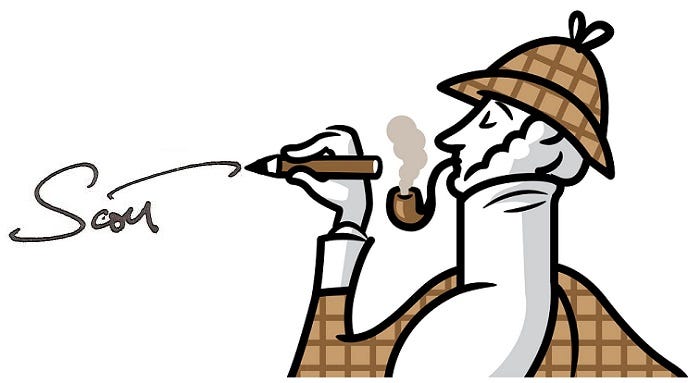Welcome to “Off the Clock,” the fortnightly Saturday edition of Timeless & Timely, where we have fun with history and language.

“O brave new world,
That has such people in’t.”
— William Shakespeare, 1610
As times change, so too does the language we use to describe things.
And while the English language shows a wonderful ability to sprout new words every year, there are also some existing words perhaps words that go out of favor or historical words that we’ve forgotten.
Earlier this week, Elon Musk tweeted “Novus Ordo Seclorum” (“New World Order)”. Well, given that ominous announcement, I thought perhaps it’s time for Novus Ordo Verborum.
Maybe not new, but new to you.
And I’ve got some related books for you at the end, so make sure you read all the way through.
Old World Words
While these are not new words, they may be new to you — particularly if we look at some historical words.
Recrudescence
[ree-KROO-des-uhns]
(n.) The return of something terrible after a time of reprieve.
Etymology: from the Latin verb recrudescere, meaning “to become raw again” (used, for example, to refer to wounds).
Used in a sentence: “With that comes the prerogative to employ medieval cruelties — recrudescences from pre-modern empire redeployed in the present.” — Melik Kaylan, Forbes, Dec. 11, 2023
Latibulate
[la-TIB-byoo-leyt]
(verb) To hide oneself in a corner
Etymology: from the Latin latibulum, refuge or hiding place for animals. Its only known use is from 1623, in the writing of Henry Cockeram, a lexicographer.
Used in a sentence: “Despondent over recent happenings, Doremus decided to latibulate for a while.”
Mulligrubs
[MUHL-ih-grubz] (n., plural)
(noun., plural) 1. A state or fit of depression; low spirits. Also: a bad temper or mood.
(n.) 2. A stomach ache, colic.
Etymology: alteration (probably influenced by grub) of earlier mulliegrums, perhaps alteration (perhaps influenced by obsolete English mully, meaning dusty, moldy.
Used in a sentence: “Overcome with a sudden bout of mulligrubs, I just don’t feel like doing anything today, so I’m not going to be coming in to work.”
I wrote about other historical words that should be brought back in a previous edition of Off the Clock:
New World Words
There are other more modern words that you should probably become familiar with.
Magnanimous
(adjective) Generous or forgiving, especially toward a rival or less powerful person
Used in a sentence: “He was magnanimous in victory, wanting to avoid the gauche behavior of other sore winners.”
Authoritarian
(adjective) Of, relating to, or favoring a concentration of power in a leader or an elite not constitutionally responsible to the people.
Used in a sentence: “Those of us who escaped authoritarian regimes often feel especially grateful for our ability to express our opinions without fear of repercussions.” — Irma Becerra, Forbes, Oct. 28, 2024
Autocrat
(noun) 1. A person (such as a monarch) ruling with unlimited authority.
2. One who has undisputed influence or power
Used in a sentence: “Modern autocrats like Hungary’s Viktor Orbán, Russia’s Vladimir Putin, El Salvador’s Nayib Bukele, India’s Narendra Modi, Turkey’s Recep Tayyip Erdoğan, and Venezuela’s Nicolás Maduro show disdain for the will of their people.” — Cecilia Menjívar, Scientific American, Sept. 23, 2024
Strongman
(noun) One who leads or controls by force of will and character or by military methods.
A strongman typically values loyalty over competence.
Used in a sentence: “Attacks on Soros have increased in recent years, just as antisemitic attacks have also risen, many of which stem from right-wing influencers, who vocally champion the international strongmen Soros opposes.” — Liam Reilly, CNN, Sept. 30, 2024
Kakistocracy
(noun) Government by the worst, least-qualified, or most unscrupulous citizens.
Used in a sentence: “What fills me with doubt and dismay is the degradation of the moral tone. Is it or is it not a result of Democracy? Is ours a 'government of the people by the people for the people,' or a Kakistocracy rather, for the benefit of knaves at the cost of fools?” — James Russell Lowell, in a letter to Joel Benton, 1876
Oligarchy
(noun) A government in which a small group exercises control especially for corrupt and selfish purposes.
Used in a sentence: “Before the Civil War, the court was a key ally to the slave-holding oligarchy in the South.” — Ian MacDougall, Harper’s Magazine, Sept. 28, 2022
Are you enjoying these words? No? Well, you’d better get used to them.
Whether you like it or not.
There’s so much to learn,
Related Reading
Books
Brave New World by Aldous Huxley (Bookshop.org | Amazon)
It Can’t Happen Here by Sinclair Lewis (Bookshop.org | Amazon)
On Tyranny: Twenty Lessons from the Twentieth Century by Timothy Snyder (Bookshop.org | Amazon)
Strongmen: Mussolini to the Present by Ruth Ben-Ghiat (Bookshop.org | Amazon)
You can find all of the books I recommend on lists at Amazon and Bookshop.org. When you buy books through these links, it supports the newsletter.
Timeless & Timely Entries
Tyrants at the Gate: In business and politics—they can be found everywhere
It CAN Happen Here: It is happening here









I'm loathe to heart this given the subject so instead I offer you this word: Touché.
I thought limiting words would limit thought as in 1984 yet I see now that we feel whether we know a single word that expresses our feelings or not. New words have not improved my understanding or eliminated my dread. I appreciate the education tho. I think I’ll go write some old truth in that corner with a blanket over my head petting the cat.